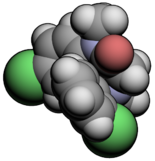|
Mexazolam
Mexazolam[1] (marketed under the trade names Melex and Sedoxil)[2] is a drug which is a benzodiazepine derivative.[3] Mexazolam has been trialed for anxiety and was found to be effective in alleviating anxiety at one week follow-up. Mexazolam is metabolised via the CYP3A4 pathway. HMG-CoA reductase inhibitors including simvastatin, simvastatin acid, lovastatin, fluvastatin, atorvastatin and cerivastatin inhibit the metabolism of mexazolam,[4] but not the HMG-CoA reductase inhibitor pravastatin.[5][6] Its principal active metabolites are chlorodesmethyldiazepam (also known as chloronordiazepam or delorazepam, trade name Dadumir) and chloroxazepam (also known as lorazepam, trade name Ativan).[7] See alsoReferences
|
||||||||||||||||||||||||||||||||||||||||||||||||||||||||

